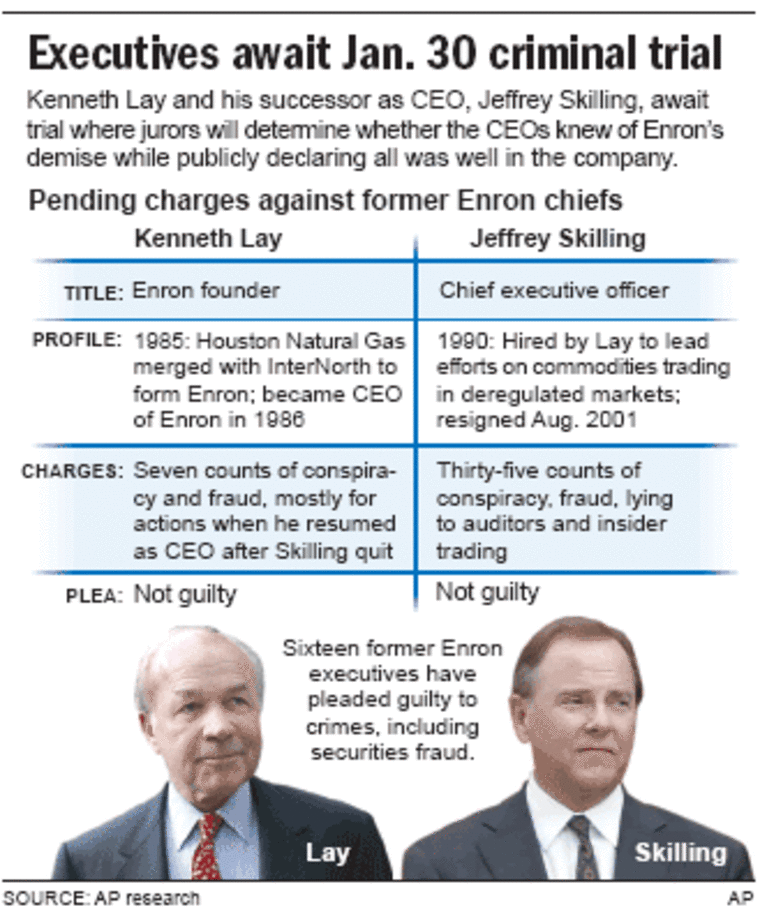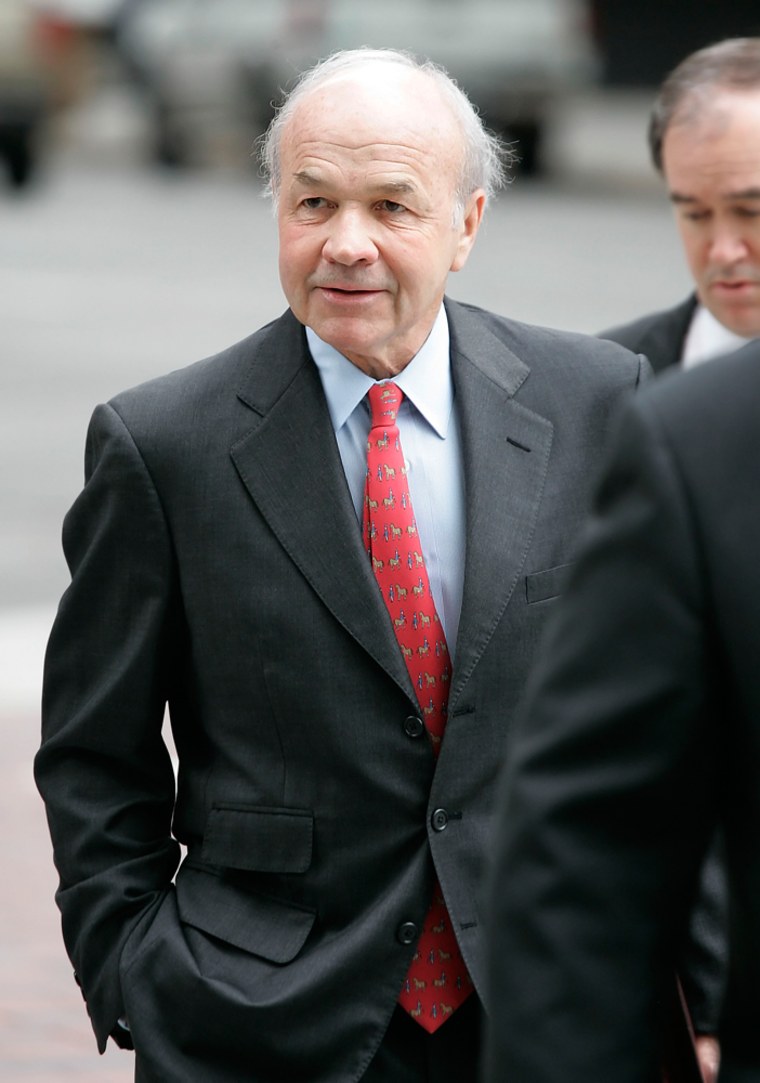He once had President Bush’s ear and Houston in the palm of his hand.
Now Enron Corp. founder Kenneth Lay faces an uncertain future dependent on whether a dozen jurors and a federal judge deem him guilty of crimes that could send the 63-year-old to prison for the rest of his life.
“Of anything and everything that I could imagine might happen to me in my lifetime, the one thing I would have never even remotely speculated about was that someday I would become entangled in our country’s criminal justice system,” Lay recently told an audience of Houston business and academic leaders.
Lay isn’t friendless. But the clout he enjoyed as a top Houston mover and shaker with White House connections is long gone.
“He’s been bruised badly,” said the Rev. William Lawson, a longtime Lay friend. “You don’t often come back to the place where you once were when someone puts this kind of mud on you. I don’t think he’ll ever be the go-to guy he was.”
Lay goes to trial Jan. 30 on seven counts of fraud and conspiracy for allegedly lying to investors and Enron employees about the company’s health before the onetime energy giant flamed out in December 2001.
Alongside him will be former Enron CEO Jeffrey Skilling, who faces 35 counts of fraud, conspiracy, insider trading and lying to auditors for allegedly conspiring to fool Wall Street into believing in a facade of success.
When that jury begins deliberating, Lay will go on trial without a jury before U.S. District Judge Sim Lake on charges of bank fraud and lying to banks about his intention to use $75 million in loans to buy Enron stock on margin.
Both Lay and Skilling have pleaded not guilty to all charges.
The scandal forced Lay to resign from corporate boards, rein in philanthropy and be labeled a pariah by many in the city where politicians, charities and civic leaders once cultivated his friendship.

“Lay was the great hero of Houston. He was the kind of civic leader who led the business community to all kinds of major investment in the city that might not otherwise have happened,” said Stephen Klineberg, a sociologist at Rice University.
However, Klineberg said many feel betrayed by Lay.
“There’s this guy who was so sort of seemingly selfless, committed to improving the city and wanting to make Houston a better place, who was meanwhile doing things or things were happening under his watch that were clearly destructive to people,” the sociologist said.
Lay’s contributions to the nation’s fourth-largest city are numerous.
In 1990 he took charge of planning a World Economic Summit in Houston for his friend, then-President George H.W. Bush. A few years later he galvanized Houston’s business community to reject a referendum that would have rescinded city affirmative action programs.
A 1996 referendum to build Enron Field, $251 million home to the Houston Astros, now called Minute Maid Park, barely passed after Lay mobilized support from business and black communities.
“His prestige, the respect people had for him then was extremely important,” Houston Astros owner Drayton McLane said. “We wouldn’t have won it without his support.”
After Enron crashed, the Astros shed the company’s $100 million, 30-year naming rights deal and erased its name from the ballpark.
“It hurt personally because I had such admiration for Ken and Enron,” McLane said. “But that was the right thing to do at the time.”
Howard Jefferson, a former assistant superintendent for the Houston school system and past president of the city’s NAACP chapter, said Lay had uncanny ability to raise money, including $250,000 so the chapter could host the NAACP’s 1991 annual convention in Houston.
“By doing that he gained a lot of credibility with community leaders,” Jefferson said.
Lay and his wife, Linda, gave generously to mostly Houston causes, including the arts, hospitals, museums, the NAACP, churches, AIDS research, animal shelters and his alma maters, the University of Missouri and the University of Houston.
In 2000, the Linda and Ken Lay Family Foundation gave $2.5 million, according to Internal Revenue Service records. That jumped to $6.1 million in 2001. After Enron’s collapse, IRS records show the foundation donated nearly $600,000 in 2002 and $1.25 million in 2003, the most current figures available.
Lay was the impetus behind a periodic award for public service — once dubbed the Enron Prize — given by Rice University’s Baker Institute for Public Policy. Recipients included Colin Powell, Mikhail Gorbachev and — three weeks before Enron went bankrupt — Alan Greenspan, who expounded on ethicism.
The Lays’ political contributions included nearly $800,000 to Republicans and about $86,000 to Democrats from 1989 though 2001, according to the Center for Responsive Politics, a watchdog group. Most of Enron’s $5.77 million in campaign contributions in the same time span also went to Republicans.
President George W. Bush received more than $550,000 from Enron during his political career — the most from any single source — and Lay contributed $100,000 for his first inaugural gala.
In April 2001 Lay met with Vice President Dick Cheney to discuss energy policy, including the 2000-01 power crisis in California. The next day, Cheney said the Bush administration wouldn’t support California price caps on wholesale energy sales.
Lay’s influence evaporated when Enron became synonymous with cooked books. He was among top executives seen as evildoers who cashed out millions in stock before Enron went bankrupt.
As Enron spiraled, Lay’s calls to close Bush friend Commerce Secretary Don Evans and then-Treasury Secretary Paul O’Neill solicited no offers to help avert disaster. Later Lay declined to testify at a February 2002 congressional hearing and listened as lawmakers berated him, one likening him to a carnival barker.
Lay insists Enron wasn’t corrupt. He says the company would still be strong if some finance executives — led by former finance chief Andrew Fastow — hadn’t orchestrated dirty deals and skimmed millions. Lay says he’s innocent of any wrongdoing and points to Fastow as the crook who abused his trust.
Lay calls Enron’s fall that left thousands jobless “the most devastating and heartbreaking tragedy of my life.” He says his and his wife’s $400 million net worth, which mainly consisted of Enron stock, fell to less than $20 million, with most earmarked for legal fees.
The Lays shed homes, a lot and beachfront properties in glitzy Aspen, Colo. and Galveston for more than $24 million and other properties in Houston for $3.8 million. The government aims to seize the couple’s condominium in one of the city’s most exclusive high-rises if Lay is convicted.
Willie Alexander, a Lay friend and chairman of the Houston Forum that invited Lay to give his speech more than a month before the trial, said no one has matched Lay as Houston’s go-to guy.
“We all make mistakes in our lives, and it’s up to the judge and the jury or whatever to determine whether or not he’s made a mistake,” Alexander said. “Ken Lay’s legacy for all the good things he’s done will live on forever.”
